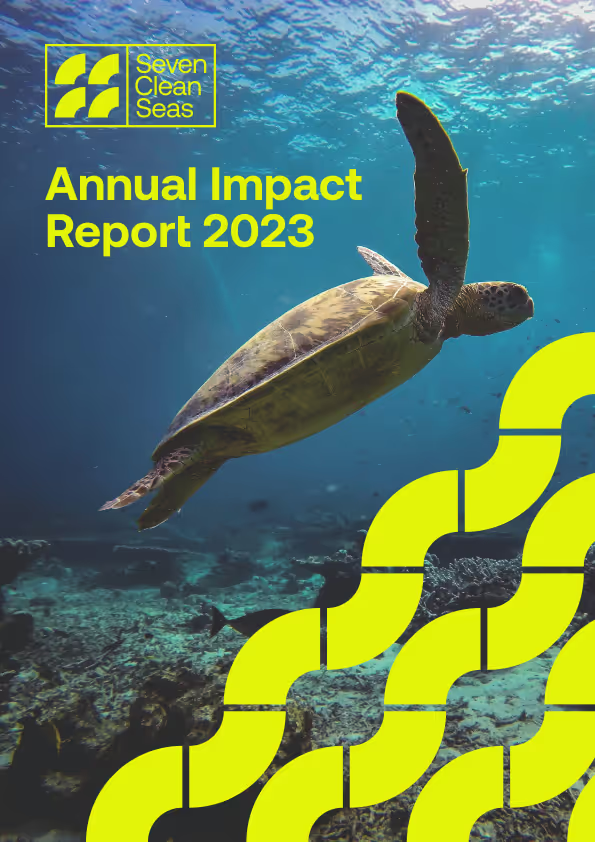Happy Women's Day! Today, we celebrate the incredible achievements of women in every field, from CEOs to stay-at-home moms. While we should honor women every day of the year, today is a special reminder to reflect on the social, economic, cultural, and political contributions women have made globally, as well as the challenges they still face. It is a day to recognize the incredible role that women play in society, and to reflect on the challenges that women still face and need to be addressed for a more equal and just world. This year, as we celebrate Women's Day here at Seven Clean Seas, it's important to remember not only the critical role that women play in solving the plastic crisis, but also the challenges they face as one of the groups most affected by it.
Women are most affected by the environmental crises
In many parts of the world, women face a disproportionate burden of the impacts of plastic pollution, particularly in low- and middle-income countries where they often work in the waste sector. As a result, women make up a significant proportion of the informal waste sector, where they frequently work in hazardous and low-paid conditions to collect and sort plastic waste.
Studies have shown that women in this sector earn less than their male counterparts, despite working the same number of hours (US$128.3 for men and US$69.7 for women).
For women who are the primary breadwinners for their households, this means they have to work even harder to provide for their families, often putting additional strain on themselves and their daughters. In many cases, this pressure forces young girls to leave school to support their families, limiting their future prospects and in many cases, violence can be used against women as a means of control, reinforcing power imbalances and gender inequality.
Furthermore, women are typically responsible for managing household waste, which can expose them to harmful chemicals and pollutants found in plastic. In many areas of the world, the open burning of plastic and the use of plastic as a replacement for coal in cooking is still a common practice, which can cause respiratory problems, skin irritations, and other health issues that predominantly affect women. Addressing these challenges requires a multi-faceted approach that recognizes and addresses the specific challenges that women face in the waste sector and beyond. By empowering women and promoting gender equality, we can take down some of the barriers to effective sustainable development that restrict women’s access to resources and decision-making opportunities.

Women are underrepresented in decision making
Women don’t have a seat at the table, an even if they do, these are sits that were never designed for a woman to sit in. What we mean by this is that women are significantly underrepresented in decision-making roles, ranging from national governments, local community groups and businesses. Not suprisingly, less than a quarter of national parliamentarians worldwide are women, highlighting the immense gender gap in decision-making. Even in environmental decision-making positions, women hold only 12% of top ministerial positions globally. The situation is similar in business, where women hold only 31% of senior leadership roles globally. To illustrate this, less than a quarter of all national parliamentarians globally are women. These statistics suggest that there is still a significant gender gap in decision-making positions, so if women are not at the table discussing and planning ways to address the struggles that women (around 50% of the population) face, then how are we going to find and implement solutions that will address women's problems?
Closing the gender gap to reduce the environmental impact
As we have highlighted, women are the most affected by the environmental crisis, but they are also crucial to the solutions. By empowering women through education, closing the pay gap (e.g. same pay for same job- not a $60 USD difference for collecting waste) and giving them a seat in the table, women can take a leading role in addressing the environmental challenges we face, thereby creating a more just and sustainable future for all.
Women are uniquely positioned to help solve the plastic waste crisis. Women are often the primary caregivers in their households. This means that they are responsible for managing household consumption and waste, therefore they play a key role in reducing plastic waste by adopting sustainable practices. Moreover, women are resourceful and natural innovators. By improving education and providing opportunities for women to use their creativity and talents and access funding opportunities and support, communities can find local solutions to the plastic waste problem. There are examples all around the world of women using plastic waste to create useful products ranging from bags, to construction materials. Learn about some incredible women-led businesses that are tackling plastic pollution here.
Women are also powerful advocates. Women can use their voices to advocate for policies that address the issue of plastic waste. If given the opportunity, they can provide a much-needed perspective to address some of the challenges that women in the waste sector face, as well as solutions to these issues.
By allowing women to participate in decision-making processes related to waste management and environmental protection, countries and communities can ensure sustainable development for all.
Although it is great to see the work that some amazing women advocates are doing, from Greta Thunberg bringing attention to the climate crisis, to Melati Wijsen to plastic pollution and Leah Thomas on intersectional environmentalism, they are still underrepresented and even attacked for the perspectives they bring.
So, if we want to achieve an effective sustainable ecosystem management, gender inequalities need to be addressed. Promoting gender equality, empowering women, and giving them an equal voice and opportunity to make decisions are essential steps towards a just and sustainable future. Ultimately, this is not only the right thing to do but also crucial. By working together and ensuring that everyone has a seat at the table, we can build a more equitable and resilient world for all.















